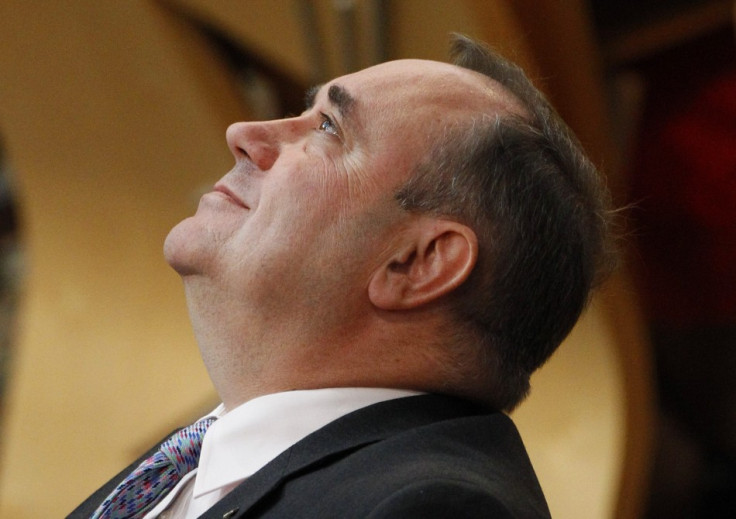Mr Salmond's Referendum Mandate - Scotland's Right or Westminster's Gift?

In 1955, the Scottish Unionist Party, later to be renamed the Scottish Conservative and Unionist Party in 1965 and simply the Scottish Conservative Party by 1977, won 50.1 per cent of the vote and 36 of 71 Scottish Westminster Parliamentary seats at the General Election on 26 May of that year, with Sir Anthony Eden, the Conservative Prime Minister, increasing the Party's overall majority in the House of Commons.
That same General Election saw two Scottish National Party (SNP) candidates stand. Between them, they managed to get a total of 12,122 votes, about a half of one per cent of the total vote in Scotland. It may have taken over a half-century, but from a political joke in the Fifties and Sixties, by 2007, the SNP had emerged as the largest single political party in the General Election for the Scottish Parliament in Edinburgh which was (re-) created in 1999.
In that Election, the SNP won 47 seats with 32.9 per cent of the vote, to the Scottish Labour Party's 46 seats gaining 32.2 per cent of the vote. The Scottish Conservatives were a distant third with 17 seats and the Scottish Liberal Democrats, fourth with 16 seats, both achieving just over 16 per cent of the vote. When the Constituency votes were counted, it was shown that the SNP had advanced their share of the vote by 9.10 per cent whilst Scottish Labour's share had slipped by 2.50 per cent.
There was in addition, one Independent MP and the two Green Party MPs. Mr Alex Salmond became First Minister of Scotland and decided to form a minority government sometimes needing and getting the Green Party votes to pass through the SNP's programme.
Roll on another four years to the Scottish General Election of 05 May 2011 and would you believe it but the mixed member proportional representation system specifically designed to prevent any single-party government, does precisely that, with a stunning victory by the SNP!
Taking over 45 per cent of the Constituency votes, the system fails due to the fact that the SNP won an almost equal percentage (44) of the List votes, something not meant to happen under this complex voting procedure designed to ensure proportionality amongst all the political parties standing - five main plus others. (Presumably, a large number of voters of the other main parties must have marked the SNP as their second-choice party on the (separate) ballot paper). The outcome: the SNP achieves an overall majority with 69 of the Scottish Parliament's 129 seats.
Probably for the past 40 years seen as the party with most power in Scotland, the Scottish Labour Party in recent decades can be depended upon to deliver a substantial bloc vote to any Labour Leader at Westminster, so the Scottish Assembly Election in 2011 was seen as little short of a disaster.
Scottish Labour finished with seven fewer seats at 37 - but the real alarm after the shock of the loss of cherished Glasgow constituencies - was the increase of votes cast for the SNP indicating that Scottish Labour had only managed to retain their own core vote.
The SNP won 902,915 Constituency votes, an increase of 12.5 per cent and 876,421 List votes, an increase of 13 per cent. The respective Scottish Labour tally was 630,461, down only a half per cent, and 523,559, down 2.8 per cent meaning that the Party was unable to attract the second-choice votes that it had expected, especially from the Liberal Democrats. Some in the Party wondered where the new blood was going to come from. Adding to the gloom was the fact that Scottish Labour Leader, Iain Gray, had scraped home by just 151 votes and immediately announced his intention to resign.
The Scottish Conservative Party lost five seats, though their share of the vote was down just some two per cent but for the Liberal Democrats it had been a night of real pain as they saw their vote and seat count collapse and it has been estimated that up to 80 per cent of the Lib Dem second-party choice vote went to the SNP. Both these Parties' Leaders have since resigned.
This, then, in a nutshell, is the basis for Mr Salmond and the SNP declaring that they have a mandate from the Scottish people to declare a Referendum on Independence at a time and with a question and voter franchise of their choosing.
A perfectly reasonable attitude given the above circumstances one might assume. But wait a minute. Is the "mandate" legal?? Only if it is within the First Minister's powers under current legislation. It is not what he or his Party would wish for the law to say but what is actually on statute that matters. Ask your Deputy Mr Salmond, she's a solicitor. Only if terms for a Referendum are covered can you go ahead against Westminster's efforts to thwart your ambition.
© Copyright IBTimes 2024. All rights reserved.






